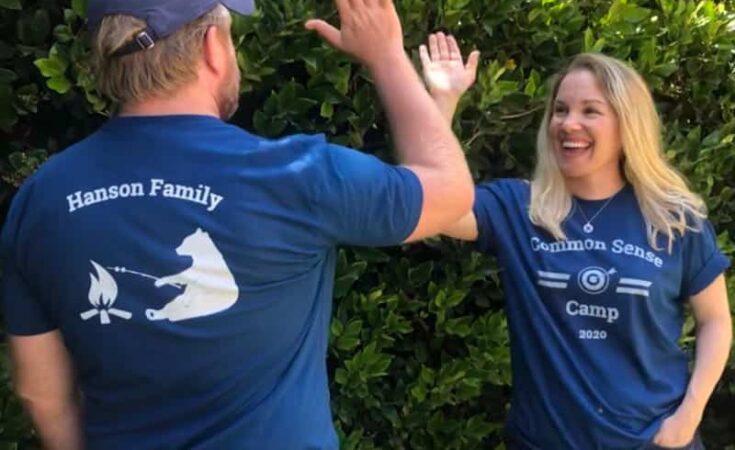Why we’re focusing on life skills this summer
One of my favorite Gary Larson cartoons features a boy pushing mightily against a door marked PULL at his “School for the Gifted.” This image took on new meaning when I became a parent, as our kids seemed to be, let’s say, heavy on the book smarts.
As a former English teacher, I reveled in having precocious readers. Like sitcom bookworms, however, they can be befuddled by the practicalities of daily life, the very things that help young people thrive in the real world, as beautifully argued by Julie Lythcott-Haims in How To Raise an Adult.
We often joked that our kids needed Common Sense Camp
Observing our kids struggling with ordinary tasks, my husband and I have often joked they would benefit from “Common Sense Camp.” So with normal summer options off the table this year, we decided it was time to launch our own Common Sense Camp, made possible by the privilege of having flexible schedules and the ability to work from home.
With our goals and values in mind — and using Catherine Newman’s latest book, How To Be a Person, as a reference — we developed an eight-week life skills curriculum.
In addition to requiring daily self-care (sleep, physical activity, hygiene, regular meals/snacks) and making space for downtime and fun, we are dedicating each week to a major topic, ranging from quotidian household chores to inner work with community impact.
We will explore the material through a mixture of direct instruction, independent research, and hands-on practice; to reinforce concepts and keep the conversations going, we are gathering a list of on-theme movies for family viewing.

Common Sense Camp: Weekly curriculum
Week One: Anti-Racism
Building on recent conversations and leaning heavily on the now-viral list of resources for white families, we will include lessons on a range of topics, such as microaggressions, events from Black History, and practical steps for becoming better allies and activists.
Week Two: Kitchen Confidence
We’ll go over the fundamentals, like reading a recipe, knife skills, and clean-up, and the week will culminate in a dinner-for-four prepared without any adult assistance.
Week Three: DIY
We’ll cover how to use common tools, change a lightbulb, and make small home repairs. To supplement our in-person lessons, we’ll draw on the charming Dad, How Do I? YouTube channel. The final project options: hanging a picture, assembling a piece of Ikea furniture, or painting a wall.
Week Four: Laundry and Cleaning
Because our kids already have some experience, we’re focusing on deep cleaning and raising the standards for daily upkeep, such as taking timely responsibility for their dishes, trash, and the other flotsam and jetsam of adolescent life. They will demonstrate laundry proficiency — from noticing the pile of dirty items (so often right next to the hamper…why?!?) to ensuring clothes that are clean, folded, and put away.
Week Five: Safety and Emergency Preparedness
Living in earthquake and fire country, we are due for a refresher on disaster preparedness and response. In addition, the kids will take online courses in CPR and First Aid, and our teen driver will review roadside safety.
Week Six: Personal Finance
We’ll address the practical things, from the logistics of old-school paper checks to using a banking app. And now that our kids have debit cards, they are ready to dive more deeply into budgeting, saving, investing, and donating — for which Ron Lieber’s The Opposite of Spoiled will be our trusted guide.
Week Seven: City Savvy
While it’s unlikely we’ll be able to venture too far from home, we are eager to equip our kids for future adventures. We’ll review how to get oriented (north/south/east/west), read a physical map, and navigate public transportation. Each child will research and plan a day of activities somewhere new, and we’ll look forward to putting the itineraries into action.
Week Eight: Social Skills
It will be a while before we’re socializing in person — and handshakes might be, sad to say, a thing of the past — but as the summer winds down, we will review basic manners and communication skills. Being a good friend and community member is one of our family’s deepest values. So whether our kids are at a party (someday), walking in the neighborhood, or on a group chat, they will have a deeper understanding of privacy, etiquette, and kindness. And because we want to go beyond just “being polite,” we will practice having difficult conversations, such as apologizing, offering condolences, or responding to an offensive joke.
It may not be regular summer camp but it’ll be close
Incorporating the Camp Spirit
We could never replace the sense of freedom and belonging of an actual sleepaway camp experience, but we’re making an effort to include some tangible aspects, such as camp t-shirts and s’mores. We will carve out space for activities like LARPing, tie-dying, and making lanyards or friendship bracelets.
We’re reserving plenty of room in the daily schedule for rest, play, boredom, creativity, and — yes, because we’re realistic — screen time.
Our Larger Purpose
The specific life skills are important, and our overall goal is even more significant: to develop conscientiousness, confidence, and empathy. So we came up with a Common Sense Camp motto: Be Observant. Be Useful. Be Kind.
Having compassion and a can-do attitude will benefit our children throughout their lives, allowing them to effect positive change in a world that needs it more than ever.
Originally published June 11, 2020 on Medium
More to Read:
Skills you Can Teach Your Teen in 15 Minutes






































